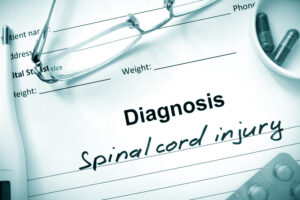 Diving can cause serious spinal injuries, but these are preventable if precautions are taken beforehand. A single dive can result in disabilities that impact your quality of life. Most diving injuries occur in swimming pools, creeks, rivers, lakes, and other swimming holes.
Diving can cause serious spinal injuries, but these are preventable if precautions are taken beforehand. A single dive can result in disabilities that impact your quality of life. Most diving injuries occur in swimming pools, creeks, rivers, lakes, and other swimming holes.
How You Can Injure Your Spinal Cord During A Dive
A spinal cord injury results from severe trauma to the bundle of nerves in the bone that run from the base of the brain to the waist. This can happen during a poorly planned dive. For example, if the diver plunges headfirst into the shallow part of a pond, their head may hit the bottom hard enough to result in this injury.
When the head strikes the bottom, the vertebrae covering the spinal cord collapse, thus preventing the nerves from transmitting signals to and from the brain. This usually leads to paralysis, but depending on the location of the injury, you can suffer from other debilitating complications as well.
This is understandable. When the entire weight of our body hits the bottom of a pool, the sheer force of the impact has an immense effect on the cervical spine. Most of these accidents occur in water that is less than three feet deep, so paralysis is imminent in most cases. According to an experienced Grayslake spinal cord injury lawyer, a preventable accident can result in permanent machine dependency.
How to Avoid Diving Spinal Injuries
Some of the best ways to avoid spinal injuries from a dive include the following:
- NEVER dive into the shallow end of a pool. There is a reason there are no diving boards there.
- Always enter feet first into the water. Don’t guess the depth and dive in headfirst.
- Do not drink alcohol before a swim or dive. It will impair your judgment, and you may dive in without taking precautions.
- Don’t dive if you are inexperienced. Water may look soft, but it cannot cushion you sufficiently if you dive in headfirst. Your body enters the water like a torpedo. The water may not be able to protect you from serious impact. Experienced divers know how to prevent serious injuries when they dive.
- Don’t think you can dive anywhere safely because you are an experienced swimmer. You may be taller than before, and each body of water is different.
Top Signs of a Spinal Cord Injury
A spinal cord injury is imminent if you fail to take the precautions mentioned above before a dive. If you experience these symptoms post-dive, call emergency services immediately:
- Weakness in your limbs.
- Cuts and bruises across your face.
- Tingling and numbness in your arms and legs.
- Difficulty breathing.
- Partial or complete paralysis.
- A tender back or neck.
Contact the Law Offices of Robert T. Edens and Get the Compensation You Deserve
You deserve fair financial compensation, whether you suffered a spinal cord injury during a dive or a car accident. Why should you pay out of pocket for someone else’s negligence? Get in touch with a compassionate and experienced Grayslake spinal cord injury lawyer from the Law Offices of Robert T. Edens today. We have years of experience fighting for the rights of spinal cord injury victims such as yourself and can ensure you get the compensation you deserve.

 A spinal cord injury can be devastating for your career, and physical health depends on its severity. Whether you injured your spine in a car crash from disease or the result of medical malpractice, the damage can be long-lasting.
A spinal cord injury can be devastating for your career, and physical health depends on its severity. Whether you injured your spine in a car crash from disease or the result of medical malpractice, the damage can be long-lasting.